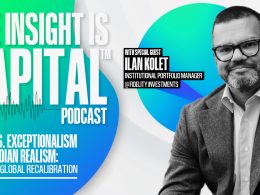Hugh Hendry, the outspoken CIO and co-founder of Eclectica, one of the UK's most successful hedge funds during the last 4 years, and in particular the last 2 years, appears in a full length interview, speaking on a variety of issues, including his thoughts on contrarianism, quantitative easing, deflation vs. inflation, his outlook for the market, and future of the hedge fund industry.
As usual, Hendry is both enlightening, and controversial, and his remarkable accuracy about the nature of the market and course during the last year make him worth listening to. Click play to view:
Part 1: The Eclectica co-founder explains why he is sticking to his guns despite having 'my tail between my legs' after the recent banking sector rally, and why the dollar could approach parity with the euro.
Part 2 : The outspoken hedge fund manager argues that the majority of his peers 'have no future', and explains his fear that tighter financial regulation will mean two decades of deflation in the second of a two part series.
Here is a complete transcript of the interview:
We have had an unprecedented period, unprecedented. Its never happened before. It's never been the case that the stock market has gone up almost 30 times in just one movement. What I'm saying to you is that the Dow Jones in 1975 was around 590 points, and in 2007, we got to around 14,200 points. I round down, you know. That's never ever happened. That is unprecedented prosperity. And the people who gained the most from that, are the fund managers, like me. Except, I'm aware of it. A lot of people are just not aware of it, to be lucky to be in the right place at the right time. But as you know, equity markets have done nothing for the past ten years, and if you look at the example of Japan, you're stretching 25 years, and you're seeing lows that we recorded in the 1980s. And I think that's coming, that's encroaching on our path.
When I go the major cities of the world, I say, hey, "Where do the fund managers live?" "Where do they work?" I want to short people like me; I'm very fearful about my profession's career. So to lay it off, I want to short these guys. "Who has the biggest portfolio of assets?" 'cause all assets are coming down, coming down. So, you're going to go from being the luckiest and the chosen, to being the unluckiest and the reviled. So, fund management franchises, insurance companies; I don't care if you're composite or if you're life. I worry about the opacity of it. The ability to see in and the ability to test the value of their portfolio. I worry about what's this mark-to-market. The banks have had the discipline of it, and we've seen what that's done to their share price. The insurance companies haven't. That's my premise, the same thing applies with General Electric, GE, GE Capital. That's a huge investment manager: $660-billion in assets and they're coming down, but they've only marked 2% of the assets to market. To my mind, if you gave that business an appropriate hair cut, it would suggest that that business is insolvent, and yet its deemed to be one of the most credit worthy companies in the world today. Nothing makes sense today.
Will the Dollar Maintain its Strength?
Whatever I say now, no one will understand, so with that caveat, I don't say that as a conceited man, I'm not talking down to anyone, its just a difficult theory, nevertheless its a theory postulated by one of the great economists of the twentieth century, Irving Fisher, and its [the kind] along the lines of paradox of thrift. And what's happening is that, or what's happened again in America is that like everyone else we took on too much debt, and at its peak we had $53-trillion, think about that, that's a lot of zeroes, $53-trillion of debt outstanding. People went crazy, they had these liabilities and they hoped that on [the other] this side, they had $53-trillion of assets, and indeed, three years ago, they probably had $80-trillion of assets, and they were looking kind of funky.
The problem is the assets, house prices have fallen 25% in the US, that's a big haircut, equity prices, they've fallen 50-60%, that's a huge haircut. Commodity prices, they're down 30%-40%-45%, that's a huge haircut. Suddenly, you're finding that as you come to create dollars [convert assets in to cash], because you own things and you sell things, you're getting less dollars. So what I want to tell you is that there is a scarcity of cash, there is a scarcity of dollars, and that sounds absurd, because here we are today, and they're announcing they're bank bailout scheme, and they're talking about $50-100-billion of government money and leveraging it, they can't break the link with the past, they want to leverage it up to half a trillion dollars. That's why I want to say to you...if you think about all of the government's announcements in the US...its small change out of $53-trillion of debt. That's why I say to you, the economy will weaken, because they're not being heroic enough, actually they believe the consensus that if you print enough money you create inflation.
Every one believes in Friedman, everyone is being slow to deal with the fact that there's this legacy of $53-trillion and its like a heavy object, just pressing the life out of the entrepreneurial spirit, and therefore keeping the economy down. Look, that's my presumption, and under that presumption, the dollar should be strong, and the dollar has been strong. Its been a frustration to the many people, the strength of the dollar. Now in the last two weeks with the quantitative easing announcement, the dollar has weakened, but I think in the process of the next month or two, you will see the dollar bottom and then go on, and I wouldn't be surprised if we got close to parity vis-a-vis the Euro within the months and years to come.
The Paradox of Contrarianism
Expert after expert lines up to tell you that the future's inflationary and you should be selling conventional government bonds. Government bonds have been in an uptrend, so that is an intellectual conceit which is not supported by the price trend, and therefore I am invested in government bonds, I'm trend following, but I'm contrarian. The dollar over the course of the last 3 years has risen. Every investment counsellor will advise you to sell dollars. I will advise you to buy. I pursuing the trend, yet I'm being contrarian. You see how it works out? So first principals are 1) identifying the idea, the opportunity, and then 2) testing it against the market. I got a computer screen on the wall and I say to my kids, Mirror, Mirror on the wall, who's the prettiest of them all? When I'm stuck, I ask the market. And if the market's trending higher, then it says I should be trying to buy them, and if its trending down, I should be trying to avoid it.
What people forget is that a successful contrarian is only contrarian 20% of the time. Less than 20% of the time do you ever dare to go against the trend. So most of the time we are pursuing trend. And yet, being contrarian.
A Bear Market Rally - A Test of Faith?
Last March, my hedge fund, we lost 16% percent. That's a hefty decline. The preceding two months, we made 25% and then we lost 16%, then we lost money in April and May, and June. I have to say, I was quite suicidal, but remember, for the year we made 32%.
So, I tell you, we could sum it up, the stock market was captured by the biblical story. It was St. Peter or St. Paul, but he was the most fervent believer. He's seen the almightiest Jesus Christ, he's there in the garden, and he says's "You're the man!" And Jesus says, "What are you talking about?" Before the cock crows three times you'll have rejected me not once, but three times. And he says "Impossible!"
That's what stock markets are all about. Here I am with my deflationary notions of what might happen. Here I am believing that there's no intrinsic value in banking stocks, and the cock's crowing and its kind of "Have I changed my mind?" I haven't. Have I changed my mind? Markets are set up to take you away from the purity and the sanctity of sensible thinking. And because of that I spend my time talking to you. I spend my time; I'm just back from China, I hug trees, I do anything but sit in my office and watch the portfolio go like that [he makes a fluttering motion].
People claim that I get very cocky. I read some of the correspondence that goes on when they've seen me on television and they were saying after my last appearance, I really was a bit cocky, so you know what? Yeah, I get my head handed to me by these people. I sober up, you're quite right, It's a lesson that has to be relearnt over and over again, that no one person is bigger than the market, that no one person has a divine right to be right. There, I hear you, I hear you [motioning hand to ear to God].
The hedge fund industry in its construction, as we know it from like, a year ago or 18 months ago is finished. Its finished, I think, yeah. And it was a disfiguration of the spirit of hedge funds. Hedge funds in the 1970s, there weren't many, they were kind of kooky, kind of maverick, eclectic people. The kind of thing that I've tried to emulate, probably with less success. And because of all those characteristics, you can never give them much mind. That's why they're alternative. You kind of respected them, but it was just too much, they were just too mad. And then you spent of the rest of your life wishing you'd given them more money. I think we go back to that environment. There are too many hedge fund managers, and not enough kooky brave independent thinking spirits out there like them. I think the mechanism that will take us there, is all these non-kooky individuals losing money. The average hedge fund lost money last year.
The average hedge fund has imposed gates and locked their clients in. They're finished. They're finished. There are hedge funds out there and they have gated, what I mean is they're denying their clients withdrawing their money. They're writing to their clients, the good news, is that we've made money in January, and February, we're making money in March. Absolute tripe! Okay, you have not made a penny, when you're denying the clients their money. So these are people who have no future, who are walking around pretending that they have a future. That time will catch up with them. Lastly, the point I want to make to you is that the common thread of these funds like Madoff, which have failed, and the example of one unveiled last week in London, this Global Macro fund, the commonality is the very low volatility. These are funds that made money in a reasonable consistent manner; it was almost linear, linear, linear, year after year after year. I never believe in linear progression.
I believe in volatility and the craziness of life as we search for the uncertain future. My returns are volatile. Our only thing is from a calendar year of risk, we never lose much money. One year, we lost 3% and it still gobbles me that we lost 3%., not 33%. On a month-by-month basis it can be crazy. So what we found, we found a conceit in that as a society, we have abolished the business cycle so rather than going up and down with the economy. Gordon Brown told us he had abolished boom bust so that we have a linear progression. Bernie Madoff was a linear progression. We could make money without doubts, hence we elevated the hedge fund community into the premier division. That was all a mistake. And, cyclicality is re-imposing itself, and I'm just warning you that cyclicality, once unleashed, isn't necessarily 2-3 years, it's 20-30 years in its formation.
Can the Regulators Save Us?
This is a big fear, I think its a legitimate fear. The fear is that there's now an open outcry, by society at large as to the remuneration, and the risk taking that was necessary over the last few years by the financial sector. And, because society has been called in to rescue the financial sector is demanding its pound of flesh. And I don't take issue with that, I accept that as the natural course of events. But, there is also this law of unintended consequences, so we look at say the British property market, and it now seems crazy. One could get up to 5 times your salary to purchase your house. And now we might impose a low amount of leverage of 2-3 times. The problem with that is that even with the decline in housing prices, no one could afford a house price if you bring down the... so that the credit leverage was only a function of asset prices being very high, and therefore you had to overarch in order to gain a competitive return as a speculator or just get on the housing matter as a regular person. The commonality between those two transaction is asset prices. They were too high.
So the regulator's coming in and trying to bring down leverage in the market, and they are after hedge funds. I don't know why... I do know why - They are rich and successful. Fair game - bring down their leverage and bring down the leverage of home buyers, prospective house buyers. The problem with that is it bakes in the notion that house prices and assets will spend the next 20 years deflating, under this more sober and conservative environment.
The Hedge Fund as Investment Laboratory
The last two weeks, nothing has been fun, because all the portfolios, they all go the same way. There's no product diversification, so one fund's doing well another one's not doing well. I don't understand that word, supermarket, and the difficult thing right now is we have no confirmation for our ideas, we're taking a pasting. Three weeks ago, we were 11 or 12 points ahead of the index and today, that's probably now 3 or 4. At the same time, we were up 10-11 points in absolute terms in the hedge fund and that's come down to 4. So everywhere I look now, my tail's between my legs. But my message is the same. All my money's in my hedge fund. The hedge fund, I believe, is as superior product, and if you've got that minimal market, those pounds, euros, and dollars, I, we've placed within the hedge fund; we use the hedge fund as a laboratory, a test pad. We incubate ideas and once they take root and they gain legitimacy, and once we start to make money on the blasted things, we can then take little transplants and put in to our long [term] holdings. Its a better way, I hope its harmonious and they can live together, one benefits from the other.
What is Eclectica's Investment Process?
We are very much free thinkers at the macro level. We, through our collective efforts in travel, in terms of information sources, in the way we look at things - you know we're trading currencies, we're trading commodity futures, we're trading government bonds, we've got fingers in the all of the pies, so when we come to look at an equity portfolio, we drill down all that wealth of experience, to try and determine the most likely path of the economy and the stocks that benefit from it. Our portfolios have undergone a dramatic change. Up until July of last year, we had up to three quarters of the portfolios invested in commodities, and the majority of that was agricultural commodities. But then, something happened. This deflation shock struck, and it hit, our crisis, and after three or four more months it hit the two year trend, and our portfolio changed. And today our portfolio is defensive. Tobacco, health care, utilities, staples. In the last three weeks that's come under enormous downside pressure. But as I say to you its three weeks and we need monthly observations. Now if that downside pressure were to continue, our portfolio would change again.
My ideological preference is that that won't happen, but I have to remain intellectually robust to change my portfolio if it does need to. As I say to you, it's not a process of three weeks or four weeks, we're not high intensity traders. New world, new price. New trend, new portfolio. That's our mantra, but today, we're still from the view that the economy is under duress and therefore we're still sticking to the low end of these trends, close to trends in the defensive stocks. Time will tell if we have to change them.
Fund Management Without Conviction
Conviction has got no role in my operation. There are concerns about Eclectica, or about, me... The concern is that you see me everywhere, you see me on CNBC, I do Bloomberg in the US, I'm on the BBC - heavens, I made a documentary for Channel Four last year, and its all high falutin stuff and it all gives the impression that there's all of this conceit and arrogance - Hey, you're taking on, I am Hugh Hendry taking on the market, but its actually driven by the reverse. I actually very fearful of having ideas that I can articulate and gain your conviction. I'm very fearful of that, and so those first principals that we built up, what we call portfolio management principles. - we developed a series of rules which are there to constrain what I can do. So I can only get involved in the portfolios as I said to you when we have the legitimacy of a positive trend. Without a postive trend, you can take my conviction and you can throw it away. You can discard it. Conviction has to married with discipline, and we've always done that, but of course, when you see the odd soundbyte, and I'm going on and pontificating about something, you forget that if the trend changes, we change the portfolio.













Comments are closed.